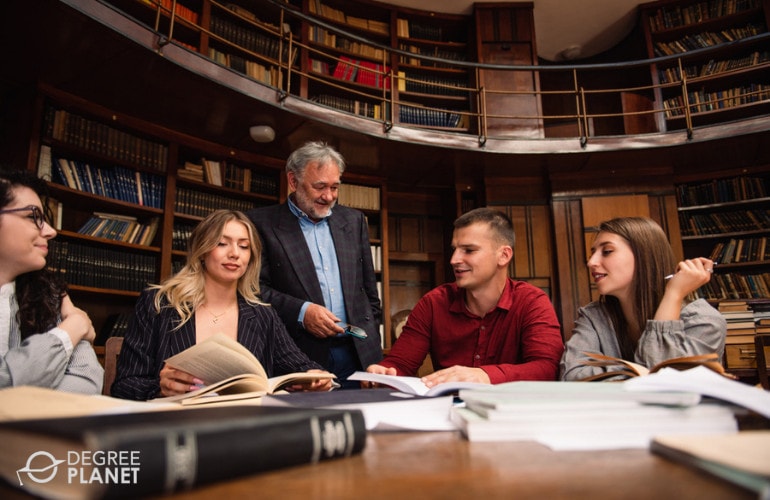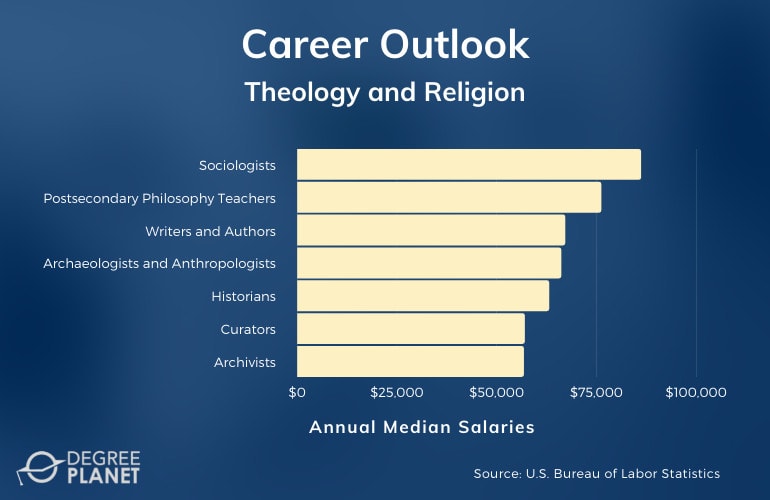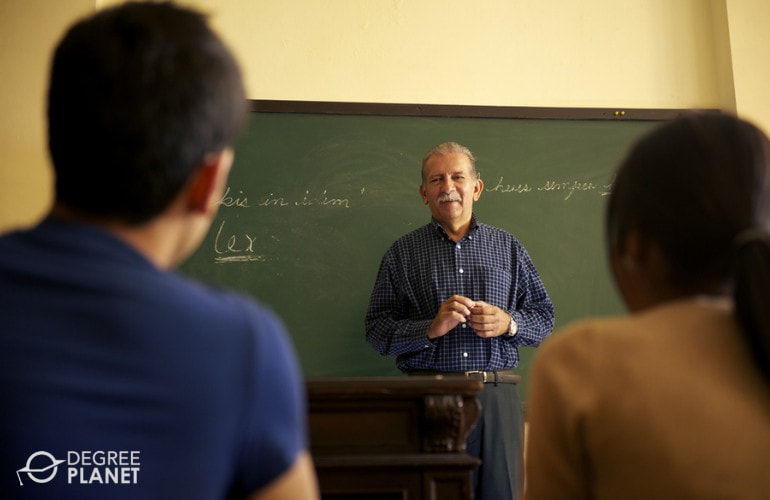For those who want to study the history or societal influence of religious belief, an online PhD in Religion could be a fitting program.

You might explore the teachings, traditions, ethics, and cultures associated with particular religious groups. As you do, you may gain a better understanding of your own faith tradition or religion in general.
Editorial Listing ShortCode:
Religion studies can be a fascinating topic for your advanced degree and your career as a scholar or practitioner.
Online PhD in Religion Programs

The field of religion explores the influence of religious beliefs and practices. Religion plays a key role in the world. It sways politics, culture, literature, and art. Understanding the power and position of religion in society can help you better understand the world.
A PhD or Doctor of Religion is a terminal degree in this field. It’s a strategic choice for those who want a scholarly career in this humanities field. It can also be a suitable degree program for those who want to work in cultural organizations, religious institutions, or other settings.
The topics that religion students study can include:
- Anthropology and sociology
- Ethics
- Modern and ancient languages
- Religious movements in history
- Research and writing
- Sacred artifacts and texts
Religion PhD students typically focus their studies around a particular area of the field. Concentration options may include Jewish studies, early Christian church, philosophy and religion, Christian theology, Asian belief systems, and Islamic studies.
Editorial Listing ShortCode:
Writing a dissertation is an essential part of most doctoral programs in religion. This scholarly research project often takes several years to complete. The first years of coursework can prepare students for this project, and the last several years of the program are spent on research and writing. Career options related to this field include professor, social science researcher, author, minister, and museum curator.
Common Online PhD in Religion Concentrations and Specializations

Considering the long history of religious practices and the variety of religious traditions in the world, it probably comes as no surprise that religion is an incredibly diverse field.
For religious doctorate degrees, it’s common to select an area of specialization to narrow down your studies. Here are a few examples of religion concentrations:
- Anthropology and Religion. This field of study addresses the connections between societal values, cultural traditions, political choices, and religious beliefs.
- Asian Religions. Your focus might be on one or more religions from a particular region of Asia and their associated literary works, art, languages, and cultural traditions.
- Christian Theology. You could spend your PhD program investigating ancient, medieval, or modern theological beliefs based on the Bible and church traditions.
- Hebrew Bible. In this track, you can study literary and cultural practices of ancient Israel and her neighbors, and you can consider the implications for reading and interpreting the Old Testament.
- New Testament. In addition to engaging in textual criticism practices, you may study the development of various schools of New Testament interpretation during one or more historical periods.
The above list represents only a small selection of the many concentrations that online doctoral programs in religion offer. If you’re interested in another focus area, such as an online doctorate in theology, you can take a look at various universities to see if that sort of program is available.
Theology and Religion Careers & Salaries

Those who earn a religion studies PhD tend to pursue careers as social scientists. Depending on their area of expertise, professionals in the field can work as historians, archaeologists, anthropologists, or sociologists. Because these areas often overlap, you may find that your work touches on several of them.
Some people with doctorates work in museums or libraries. They might research religious artifacts or preserve ancient manuscripts. According to the Bureau of Labor Statistics, careers related to the life, physical, and social sciences pay a median annual salary of $69,760.
| Careers | Annual Median Salaries |
| Sociologists | $86,110 |
| Postsecondary Philosophy and Religion Teachers | $76,160 |
| Writers and Authors | $67,120 |
| Archaeologists and Anthropologists | $66,130 |
| Historians | $63,100 |
| Curators | $56,990 |
| Archivists | $56,760 |
| Clergy | $51,940 |
| Museum Technicians and Conservators | $45,710 |
| Religious Activities and Education Directors | $45,110 |
A doctoral degree can be a qualification for academic positions as well. Working at a university might entail teaching classes and engaging in research projects. Some scholars write books or articles to present their research findings to peers and lay people alike.
Editorial Listing ShortCode:
Studying religion at the doctoral level could also enhance a ministry career. Whether you’re currently a denominational leader, a clergy member, or a religious educator, this degree program can shape the way you approach your job and guide your parishioners. Some people engage in scholarly work while also continuing as practitioners in churches, museums, schools, or other settings.
Ph.D. in Religious Studies Curriculum & Courses

Your college may require you to earn 48 or more credit hours in pursuit of a doctoral degree in religion. To accomplish that, you might take courses such as:
- Ancient Church History: In this class, you’ll study the first several centuries of the Christian church and analyze religious literature from that period.
- Approaches to Religion Study: To prepare you for further studies, you’ll engage in an overview of approaches to studying religion, including evaluating religious beliefs and practices from anthropological and theological perspectives.
- Asian Religious Thought: This course covers one or more Asian religious traditions, such as Hinduism or Buddhism, along with their sacred texts.
- Christianity in America: From early colonial days to modern church movements, you will evaluate the role of Christian values and practices in the United States.
- Creeds and Councils: This class covers early church controversies, the councils held in response, and the creeds and commands they produced.
- Dissertation Preparation: Topics in this course include determining an area of study, conducting research, or writing a prospectus.
- Ethics in Western Religions: You may explore the interplay between religious teachings and ethical beliefs and how a culture’s predominant attitude toward religion influences laws and cultural practices.
- European Reformation: You’ll study Martin Luther and other reformers and discuss the immediate and long-term implications of their reformation efforts.
- Hebrew Bible: A class on the Hebrew Bible, also known as the Old Testament, may include an exploration of interpretive theories, cultural settings, or linguistic challenges.
- Synoptic Gospels: A critical course on Matthew, Mark, and Luke will compare and contrast these similar Gospels and discuss theories about authorship, composition, and interpretation.
If your school’s religion department offers a wide variety of courses, you may have the latitude to select the ones that are best for your doctoral focus.
How to Choose a Doctorate in Religious Studies Online Program

Figuring out which university to choose for a doctoral program is a big decision, but these factors may help guide the process:
- Accreditation. Choosing a college with regional accreditation is a critical step in ensuring that you’ll earn a reputable doctoral degree.
- Concentrations. As you weigh various school options, you can search for a program that offers concentration choices that align with your area of interest.
- Faculty. If there’s a particular scholar or faculty member whose research area interests you, that may influence your decision-making process.
- Funding. Doctoral programs vary in the financial support they have available for students. Some colleges provide not only discounted or free tuition but also insurance subsidies, travel support, research funding, or other types of financial help.
- Length. If your priority is to earn your doctorate quickly, then you may want to find a school with no dissertation requirement or with other accelerated features. If you’d prefer to have as much time as possible to complete your program, then you may want to look for a school that allows students to stay enrolled for more than 5 years.
- Research opportunities. Schools have various research resources available for their graduate students. It can be beneficial to consider the collection of materials available at a particular institution.
Other factors that can influence your decision might include location, online learning options, or the reputation of the school.
Religion Doctorate Programs Admissions Requirements

Applying for a PhD program can be a rigorous process. For a doctoral degree in religion, your required application materials might include:
- GRE or GMAT scores (not required by all colleges)
- Official college transcripts from your previous studies
- Proof of proficiency in select modern and ancient languages
- Sample of your writing abilities
If you can’t meet the language requirement before beginning the program, some programs allow you to enroll in non-credit language courses early in your doctoral studies.
Religious Studies PhD Programs Accreditation

Regional accreditation confirms that a school can be counted on for a quality education. To maintain its accreditation status, a college must be regularly evaluated by one of the seven regional accrediting agencies in the US. If a school fails to meet the evaluation standards, it can lose its accreditation status.
Editorial Listing ShortCode:
Because of this thorough process, you can feel confident about investing in a doctoral program at a regionally accredited college. A regionally accredited degree will hold meaning and value among peers, employers, and other educational institutions. In particular, if you plan to work in academia, a regionally accredited degree is essential.
Financial Aid and Scholarships

Many graduate students are eligible for financial aid to help offset their college costs. Just like you might have done earlier in your college journey, you can fill out the Free Application for Federal Student Aid (FAFSA).
Based on your FAFSA results, you may qualify for state and federal student assistance programs. As a doctoral student, your main form of government aid will probably be loans. Grants are less common for those in graduate school. Your college may be a key source of doctoral funding. Some schools offer a full ride to doctoral candidates in exchange for teaching or research assistance. Others offset a portion of the costs.
You may also have the chance to win scholarships or fellowships from outside organizations. These may contribute toward tuition, conference attendance, or research expenses. If you remain a full-time employee while going to school, your workplace may even contribute to the cost.
Is There a PhD in Religion?

Yes, both faith-based and secular colleges offer PhD programs in religious studies. This can be a valuable degree program for people who are interested in a scholarly approach to the study of religion and its effects in the world.
Some colleges specialize in religious studies related to one particular people group or faith tradition. For example, the department may focus on studies in the Hebrew Bible and ancient Israel. Other colleges have diverse religion departments. Students there may be able to choose any number of focus areas, including American religious expressions, global Islam, Asian religions, and New Testament studies.
What Can You Do with a PhD in Religious Studies?

People often pursue a doctoral degree in religious studies with an academic career in mind. Some want to become professors or lifelong researchers, and their work can overlap with studies in archaeology, history, or philosophy.
According to the Bureau of Labor Statistics, there are historians who work for the government, consulting firms, research institutions, or museums. Other museum job titles include archivist and curator. Religious leaders can also earn this degree.
Getting a PhD can help people become more insightful ministers or more knowledgeable religious educators. Some professionals with a PhD also write books and articles for scholars or the general public.
How Long Does It Take to Get a PhD in Religion Online?

It’s common for full-time students to spend up to 5 years in a doctoral program when a dissertation is required. The first 2 to 3 years are mostly devoted to coursework. Toward the end of that time, you can begin to transition into the dissertation process. The fourth and fifth years may be invested in writing the dissertation and possibly teaching some classes.
Some programs allow students to extend this timeframe if they are in school part-time or need an extra year for dissertation work. On the other hand, programs without a dissertation requirement can typically be finished in just 3 years with full-time study.
What’s the Difference Between Philosophy vs. Religion?
For a humanities doctorate, you can choose to study philosophy or religion.
| Religion | Philosophy |
|
|
Some universities offer a religion PhD with a philosophy concentration.
What’s the Difference Between an Online PhD in Theology vs. Religious Studies?
Theological and religious studies sound similar. At some universities, they may even be housed in the same school. Even still, the two programs have different approaches to the study of faith.
| Theology | Religious Studies |
|
|
Typically, religious institutions, such as either brick-and-mortar or online Christian colleges, are more likely than secular ones to offer theological studies. In fact, a number of students who have work or other outside obligations often pursue an online degree in theology or in religious studies.
Is a Doctorate in Religion Worth It?

Yes, a doctorate in religion is worth it for many students. This degree program could be the culmination of many years of study in religion or a related field. It may be essential to earn a PhD if you want to be a tenure-track professor or a respected social scientist.
Editorial Listing ShortCode:
According to the Bureau of Labor Statistics, jobs for professors are expected to increase at a 12% rate over the next decade. That’s faster than the national average for job growth. Also, a 19% growth rate is predicted for museum occupations, such as curators, archivists, and conservators.
Universities Offering Online Doctorate in Religion Degree Programs
Methodology: The following school list is in alphabetical order. To be included, a college or university must be regionally accredited and offer degree programs online or in a hybrid format.

Amridge University offers a Doctor of Philosophy in Biblical Studies. Students may also choose to add a concentration in the Old Testament or the New Testament. Both tracks require students to complete 51 credit hours with a minimum GPA of 3.0 to graduate. Those interested in the program may apply online with official transcripts.
Amridge University is accredited by the Southern Association of Colleges and Schools Commission on Colleges.

Anderson University offers a Ph.D. in Leadership with a concentration in Christian Ministry. The program requires the completion of 48 credit hours to graduate and can typically be completed in 24 months. All classes can be taken online. Those interested in the program may apply online through the school’s website.
Anderson University is accredited by the Commission on Colleges of the Southern Association of Colleges and Schools.

Bethel University offers a Doctor of Ministry. Students can choose a concentration in Biblical and Theological Engagement, Church Leadership, Congregation and Family Care, or Transformational Leadership. The program can be completed fully online or online with on-campus intensives. Applicants can apply by contacting an enrollment counselor and submitting an application through the school’s website.
Bethel University is accredited by the Higher Learning Commission.

Bob Jones University offers a Ph.D. in Theological Studies. Students must select a concentration in Biblical and Systematic Theology, New Testament Interpretation, or Old Testament Interpretation. To graduate, students must complete 60 credit hours. Online classes are 7 weeks long. An application can be submitted through the school’s website to apply.
Bob Jones University is accredited by the Southern Association of Colleges and Schools Commission on Colleges.

California Institute of Integral Studies offers a Ph.D. in Ecology, Spirituality, and Religion. Students must complete 36 credit hours, a dissertation, and 2 comprehensive exams to graduate. Applicants must have a master’s degree in a related field with a GPA of 3.0 or higher and submit 2 letters of recommendation and a writing sample.
CIIS is accredited by the Western Association of Schools and Colleges.

Calvary University offers a Doctor of Philosophy in Bible and Theology. To graduate, students must complete 36 credit hours. Those interested in the program must have a master’s degree in a related field with a minimum GPA of 3.0. Applicants must submit transcripts from all schools attended, a writing sample, and 2 references and complete an interview.
Calvary is accredited by the Higher Learning Commission.

Clarks Summit University offers a Doctor of Philosophy. Concentrations in Old Testament, New Testament, Systematic Theology, or Bible Exposition are available. Students must complete 60 credit hours to graduate. Those interested in the program may apply online through the school’s website. Admissions counselors may be contacted to help through the admissions process.
Clarks Summit University is accredited by the Middle States Commission on Higher Education.

Columbia International University offers an online Ph.D. in Biblical Studies. Students must complete 45 credit hours to graduate. Those interested in the program must have a master’s degree with a minimum GPA of 3.5, submit copies of their master’s thesis and 2 academic references, and complete an interview.
CIU is accredited by the Southern Association of Colleges and Schools Commission on Colleges.

Evangelical Seminary offers a Doctor of Theology. Students must choose one of the 11 tracks offered by the school, such as Missional Track, Historical Track, or Biblical Track. To graduate, students must complete 39 credit hours. Applicants must have a master’s degree with a minimum GPA of 3.0.
Evangelical Seminary is accredited by the Higher Learning Commission.

Faulkner University offers a Doctor of Philosophy in Biblical Studies. To graduate, students must complete 55 credit hours, including a dissertation. All classes are offered online. Applicants must have a master’s degree in a related field with a GPA of 3.0, submit 3 letters of recommendation and official transcripts from all schools attended, and complete an interview.
Faulkner University is accredited by the Southern Association of Colleges and Schools Commission on Colleges.

George Fox University offers Doctor of Ministry degrees in Leadership and Spiritual Formation and Semiotics, Church, and Culture. Both programs require students to complete 38 credit hours and a project portfolio to graduate. Applicants must submit an online application with official transcripts from all schools attended.
George Fox University is accredited by the Northwest Commission on Colleges and Universities.

Johnson University offers a Ph.D. in Leadership Studies with concentrations in Educational, Ministry, Missional, Organizational, Philosophy, or Theology leadership. Students must complete 60 credit hours to graduate. Those interested in the program may apply online through the school’s website. Applicants must submit official transcripts, 3 letters of reference, a writing sample, and an admissions essay.
Johnson University is accredited by the Southern Association of Colleges and Schools Commission on Colleges.

Lancaster Bible College offers a Doctor of Philosophy in Biblical Studies. To graduate, students must complete 60 credit hours, including 20 hours dedicated to a dissertation. Applicants must have a master’s degree and need to submit a personal statement, transcripts, 3 references, and MAT or GRE test scores.
Lancaster Bible College is accredited by the Middle States Commission on Higher Education.

Liberty University offers a Doctor of Philosophy in Bible Exposition. Students must complete 60 credit hours to graduate. All classes can be completed online and are 8 weeks long. To be eligible for the program, applicants must have a master’s degree in a related field, submit a writing sample, and complete a questionnaire.
Liberty University is accredited by the Southern Association of Colleges and Schools Commission on Colleges.

Luther Seminary offers a Doctor of Philosophy in Theology with the option to add a concentration in topics such as Christian Ethics or Church History. The program requires students to complete 12 courses, exams, and a final thesis to graduate. Applicants must have a master’s degree related to theology to be eligible for the program.
Luther Seminary is accredited by the Higher Learning Commission and the Association of Theological Schools.

Oral Roberts University offers a Ph.D. in Contextual Theology. Students must complete 47 credit hours with a minimum GPA of 3.25 and a final dissertation to graduate. Applicants must have a master’s degree with a minimum GPA of 3.25 and submit official transcripts, GRE test scores, 4 references, and a vocational essay.
Oral Roberts University is accredited by the Higher Learning Commission.

Regent University offers a Ph.D. in Renewal Theology with an emphasis in Christian Theology. Students must complete 60 credit hours to graduate. While classes are offered online, a residency must be completed. Applicants must submit an online application, an admissions questionnaire, and an academic writing sample.
Regent University is accredited by the Southern Association of Colleges and Schools Commission on Colleges.

South University offers a Doctor of Ministry. To graduate, students must complete 96 credit hours and one of the following: dissertation, ministry project, or supervisory clinical pastoral education. Those interested in the program must have a graduate GPA of 3.0 or higher and need to complete an admissions interview.
South University is accredited by the Southern Association of Colleges and Schools Commission on Colleges.

Southwestern Baptist Theological Seminary offers a Ph.D. in Theology. Students may choose to focus on Biblical Studies, Theological Studies, Ethics and Philosophical Studies, or Pastoral Studies. To graduate, students must complete 65 credit hours. Applicants must submit official transcripts, letters of recommendation, a writing sample, and official test scores.
Southwestern Baptist Theological Seminary is accredited by the Southern Association of Colleges and Schools Commission on Colleges.

The University of the Cumberlands offers an online Ph.D. in Leadership Studies with a concentration in Religion. Students must complete 66 credit hours and a dissertation to graduate. Applicants must have a master’s degree with a GPA of 3.0 or higher and submit official transcripts.
The University of the Cumberlands is accredited by the Southern Association of Colleges and Schools Commission on Colleges.
Getting Your PhD in Religious Studies Online

Professionals with advanced degrees in religious studies often explore the connections between religion and history, anthropology, sociology or archaeology. A religion doctoral degree can lead to a fulfilling career in research, academics, writing, or leadership.
Whether you’re interested in the study of Christianity, Islam, Judaism, Buddhism, or another belief system, this degree might suit your goals. Online religious studies degree classes can be a flexible, convenient option as you work toward a doctoral degree. Enrolling online can often enable you to work and go to school at the same time.
To get started, you can take a look at accredited colleges that offer online PhD programs in religion.

